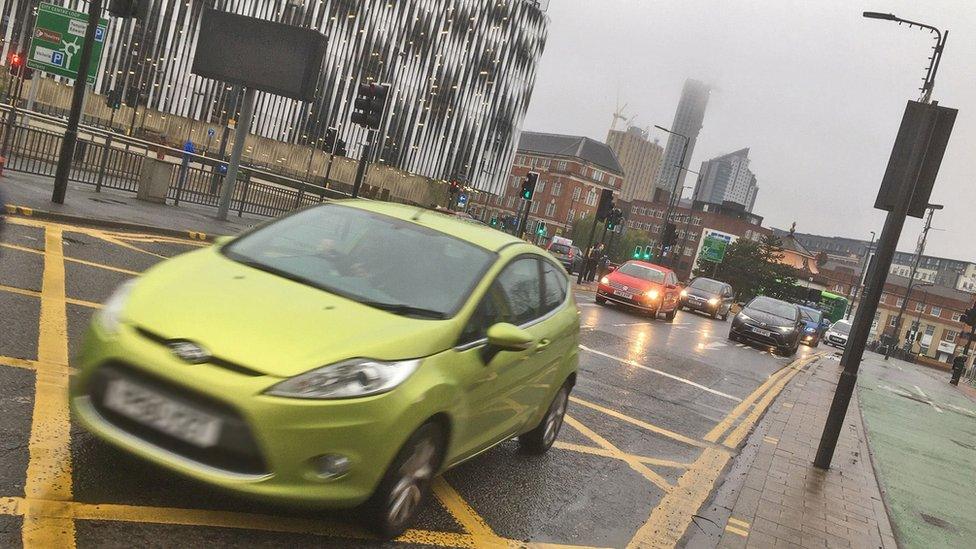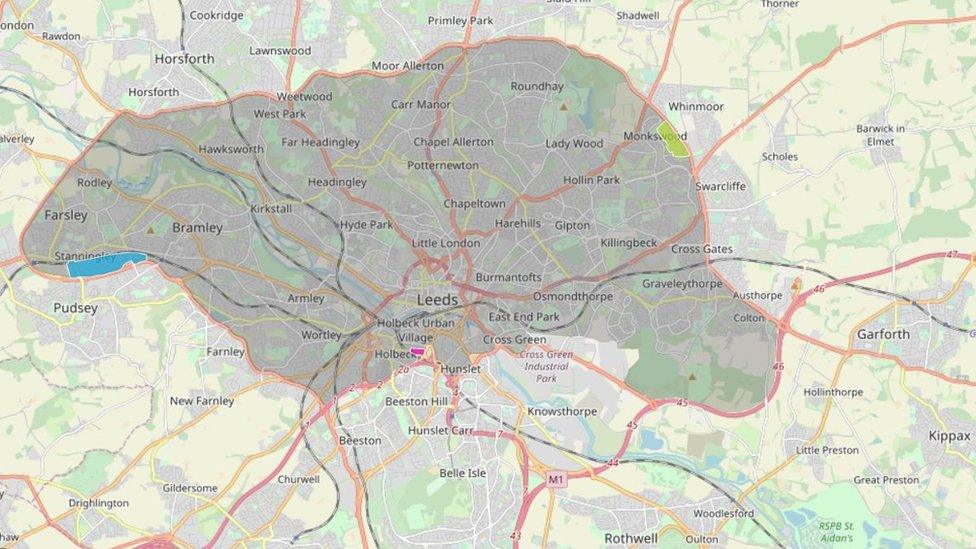Leeds Clean Air Zone: 30 taxi drivers get green loans
- Published

Some drivers in Leeds are set to face a charge under the city's new Clean Air Zone rules
Just 30 taxi drivers have received loans from a scheme set up to help them buy greener vehicles in the eight months since it launched.
Over 2,000 Leeds cabbies have applied for help to buy cars exempt from upcoming clean air zone (CAZ) charges.
But most have waited months for a decision and believe the council cannot cope with the volume of applicants.
Leeds City Council said it had to be responsible with public money and "due diligence takes time".
The CAZ was originally due to come into effect by January 2020 but has been delayed until July at the earliest.
Certain vehicles entering the city centre would have to pay a charge under the scheme.
'On track'
The government gave the council £29m to implement the zone, with £23m earmarked to help businesses adapt and get greener vehicles.
From 1 April, taxi and private hire drivers in the city were invited to apply for interest-free loans of up to £10,000 or non-repayable grants worth up to £1,500.
By June, two months after launching the scheme, the authority's documents showed it had received more than 2,000 applications., external
Documents seen by the BBC suggested the government had instructed the council to reach a decision on these by September.
But by that time, according to a council report, just £20,000 had been paid out in loans, external, while grants worth £55,000 had been awarded.
At the end of November, according to documents seen by the BBC, just 19 loans had been paid out.
The most recent figures show 30 loans have been paid, and a further 69 provisionally approved, the council said.
Despite this, the authority said it was "on track to process every pending application within the next two months".
A spokesman said the council expected to have paid "in the region" of 350 loans once all remaining applications had been processed.
The scheme would remain open "until the end of 2020 or until funding runs out", he said.
'Easier to get a mortgage'

Taxi driver Adil Hamid said some drivers in the city had resigned themselves to paying the new charge
Adil Hamid, treasurer of the Leeds Private Hire Drivers Organisation, branded the handling of loans and grants as a "cock-up".
"What we were promised and what has actually happened are totally different," he said.
"They said it would be a straightforward process... but it's taking up to seven months for some drivers to get a decision."
The BBC has been told key loan documents and a 25 to 45-minute telephone interview about applicants' finances were only available in English.
Mr Hamid said this caused problems because "a lot of the drivers are from different countries".
He further criticised a lack of consistency in the handling of applications, and said he knew of cases in which drivers "in the exact same circumstances" had received different decisions.
"It's probably easier to apply for a mortgage than it is to apply to the council," he said.
Many drivers had resigned themselves to paying the congestion charge, he said, and felt they had "no choice but to cause more pollution".
He said others who had been rejected had either borrowed money from family to buy a new vehicle or had taken out high-interest loans.
The BBC has seen details of one case in which an applicant who had received a loan agreement was told he would be paid "next week" on three occasions.
He had identified a suitable replacement vehicle, and sent details of his intended purchase in a "proposed vehicle notice", to the council.
However, the authority told him it would need three weeks to carry out a vehicle history check (HPI) before the loan was paid out.
While waiting for the check - which could be performed instantly online - to be carried out, he entered into a finance agreement with a dealership to secure the new car.
When it was found he had applied for finance, his council loan application was rejected and he chose to apply for a grant instead.
It has since reduced the waiting time for vehicle checks to 48 hours, it is understood.
What's gone wrong?

The clean air zone in Leeds will affect motorists driving inside the outer ring road
The council set up a small team of about 10 people to process loan applications.
It is understood staff recruited to work as underwriters had little or no prior experience of performing financial checks and and have complained of receiving insufficient formal training.
There have been two data protection breaches involving personal details since the launch of the scheme.
The council said these were investigated, apologies sent to those affected and "measures put in place to avoid repeat occurrences".
The BBC has also been told that:
Drivers have repeatedly been sent demands to provide documents they had already submitted
Some applications were incorrectly closed on the basis of missing documents
When drivers contacted the council to complain about this, they were advised to reapply and told the case would not be re-opened
Drivers have complained of receiving rejection letters with just one line of explanation, six or seven months after they first applied.
What does the council say?
The council said £7.3m of government funding had been earmarked to help the taxi and private hire sector and "could not be used for any other purpose".
"There is therefore no incentive for the council not to allocate this money to the trade," a spokesman said.
He said officers were "processing financial support applications as swiftly as possible" but it was necessary to ensure applicants were able to repay loans, and collecting necessary documentation "can sometimes take longer than expected".
Staff working as underwriters received "specialist formal training and are supported and advised by trained and experienced council officers", he said.
Loans would only be available to drivers who had passed the council's licensing process, which would have required them to pass an English comprehension test covering reading, writing and speaking.
The spokesman added:
The law prevented the council from disclosing the reasons for loans being rejected, and unsuccessful applicants were advised to contact the credit agency used by the authority
The council was "aware of a very small percentage of cases" where there were multiple requests for information previously provided
This was "due to human error and the volume of applications being handled" and "we have apologised directly to the individuals inconvenienced".
The council said it was unaware of cases which had been closed and applicants told to reapply.
Where drivers had been turned down for loans after entering into finance agreements, the council said all applicants read and accept published eligibility criteria as part of their initial application.
It said this included a requirement that applicants must not make any vehicle payments and must declare additional finance arrangements.